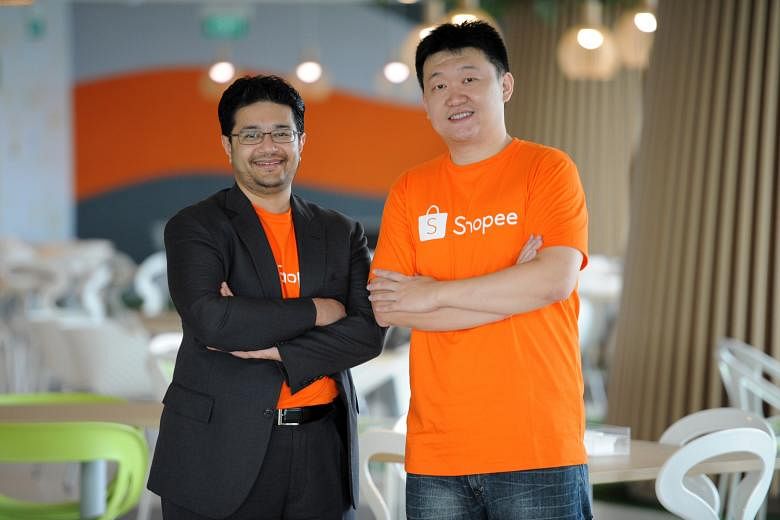At its leafy quarters on two floors in the Fusionopolis tech cluster, Singapore's first billion-dollar Internet giant houses a youthful team of its best engineers and coders.
Garena, which began as a computer gaming platform in 2009, has branched out steadily into mobile e-commerce and chat apps and is one of the bigger employers of fresh graduates, said founder and group chief executive Forrest Li.
"Last year, we hired around 40 to 50 fresh grads from Singapore. When we go to career fairs in the United States or the local universities, we make sure our booth is always the biggest," said Mr Li, 38, who hails from Tianjin, China, but is now a permanent resident here.
Today, Garena employs 3,000 people across South-east Asia, including 450 in Singapore.
The vision, said Garena group president Nick Nash, has always been for the firm to become a broad-based Internet platform company.
"If you think about consumer Internet, there are a couple of exciting places to be for building great companies," added Mr Nash, the former head of South-east Asia at private equity firm General Atlantic, where he led an investment in Garena before being wooed over by Mr Li.
"But here's the thing - you have to walk before you run. The beauty and the wisdom about starting with gaming is that it's a very robust and strong business model, so it gives you the financial stability to build other things."
With the firm's social network BeeTalk and payments network AirPay taking longer to monetise, gaming is the main contributor to Garena's US$200 million (S$284 million) in annual revenues.
And in a crowded market, sound funding buys more visibility on social media for new mobile apps like Shopee, Garena's answer to online marketplace Carousell.
Shopee's difference is that it offers an escrow service, product collection and delivery, making it that much easier for second-hand sellers and small businesses to complete a sale.
In just 31/2 months, Shopee racked up US$100 million of gross merchandise value on an annualised basis, which means it is growing 10 times faster than its closest competitor, Mr Nash said.
If it seems like Garena is in a hurry to get a piece of the action in every corner of the Internet, that is because it is.
"What worries us is how fast we can learn and how fast we can adapt," said Mr Li, who has lived by the mantra "Stay hungry. Stay foolish" since he first heard Apple founder Steve Jobs' speech to Stanford University graduates at his wife's graduation in 2005.
Mr Li, who met his wife at Stanford while doing his Master in Business Administration, is kept on his toes by the sheer pace at which the Internet has evolved in the eight years since Garena was founded.
"When we started Garena, even for traditional entertainment, it was focused on the PC because there was nothing you could do on the mobile. Over the past five years, we've seen more people start to afford a mobile phone and a data plan and they've never touched the Internet before, they've never owned a PC," he said.
The leap from desktop to mobile creates a huge opportunity, said Mr Li, and the numbers agree. Garena has 20 million active users a month across its mobile platforms, not far behind the 22 million it has on its PC-based platform.
"Mobile follows you everywhere - it's becoming an enabler of the integration with your physical, offline real life. There's a lot of things you can do with the mobile Internet, and a lot of things we have to learn."
In September, Mr Li was named one of four winners of the EY Entrepreneur of the Year Award - a long way to come for the man who first settled here with not much in the way of a business strategy.
"The thing is, my wife is a Temasek scholar; she has a six-year obligation. So basically, I was chasing her at that time and her father told me, you have to go to Singapore. No negotiation."
Mr Li's wife has been at Temasek Holdings for 10 years now, and they have two children, aged six and one.
The engineering graduate has lived here long enough that when Garena decided to name its new conference rooms after inspiring people and places, he got a Steve Jobs room, a Lee Kuan Yew room - and a Hwa Chong room.
"Because so many of our people actually went there and they felt that it was more important than college," said Mr Li, referring to Hwa Chong Institution, one of the top secondary schools here.
Garena was valued at more than US$2.5 billion in March, after closing a funding round led by the Ontario Teachers' Pension Plan.
Garena is not tying itself to a timeline for a public listing, said Mr Nash, and over the past few years, only one new investor was brought in every year and a half, typically small shareholders offering "intellectual capital" .
Over the past three years, Garena has also invested in Singapore-based online grocery store RedMart, where Mr Li does his shopping; Vietnamese restaurant reviewer Foody; and most recently Vanitee, a Singapore-based marketplace that connects beauty practitioners with customers.


